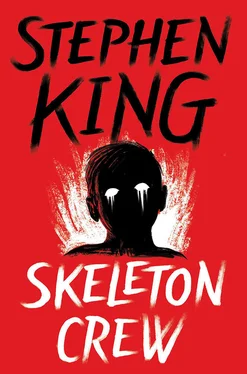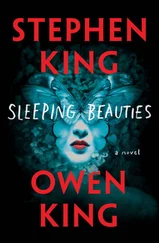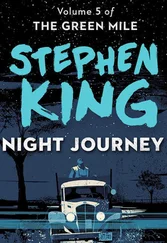Stephen King - Skeleton Crew
Здесь есть возможность читать онлайн «Stephen King - Skeleton Crew» весь текст электронной книги совершенно бесплатно (целиком полную версию без сокращений). В некоторых случаях можно слушать аудио, скачать через торрент в формате fb2 и присутствует краткое содержание. Город: New York, Год выпуска: 2016, ISBN: 2016, Издательство: Scribner, Жанр: Ужасы и Мистика, на английском языке. Описание произведения, (предисловие) а так же отзывы посетителей доступны на портале библиотеки ЛибКат.
- Название:Skeleton Crew
- Автор:
- Издательство:Scribner
- Жанр:
- Год:2016
- Город:New York
- ISBN:978-1-5011-4130-0
- Рейтинг книги:3 / 5. Голосов: 1
-
Избранное:Добавить в избранное
- Отзывы:
-
Ваша оценка:
- 60
- 1
- 2
- 3
- 4
- 5
Skeleton Crew: краткое содержание, описание и аннотация
Предлагаем к чтению аннотацию, описание, краткое содержание или предисловие (зависит от того, что написал сам автор книги «Skeleton Crew»). Если вы не нашли необходимую информацию о книге — напишите в комментариях, мы постараемся отыскать её.
Skeleton Crew — читать онлайн бесплатно полную книгу (весь текст) целиком
Ниже представлен текст книги, разбитый по страницам. Система сохранения места последней прочитанной страницы, позволяет с удобством читать онлайн бесплатно книгу «Skeleton Crew», без необходимости каждый раз заново искать на чём Вы остановились. Поставьте закладку, и сможете в любой момент перейти на страницу, на которой закончили чтение.
Интервал:
Закладка:
“Yuh, he was crazy,” the writer said, and they all laughed.
“He wrote instead,” the editor said, flicking his cigarette in the direction of the lake. “His letter said this: ‘Dear Henry Wilson (or just Henry, if I may), Your letter was both exciting and gratifying. My wife was, if anything, more pleased than I. The money is fine… although in all honesty I must say that the idea of being published in Logan’s at all seems like more than adequate compensation (but I’ll take it, I’ll take it). I’ve looked over your cuts, and they seem fine. I think they’ll improve the story as well as clear space for those cartoons. All best wishes, Reg Thorpe.’ ”
“Under his signature was a funny little drawing… more like a doodle. An eye in a pyramid, like the one on the back of the dollar bill. But instead of Novus Ordo Seclorum on the banner beneath, there were these words: Fornit Some Fornus.”
“Either Latin or Groucho Marx,” the agent’s wife said.
“Just part of Reg Thorpe’s growing eccentricity,” the editor said. “His wife told me that Reg had come to believe in ‘little people,’ sort of like elves or fairies. The Fornits. They were luck-elves, and he thought one of them lived in his typewriter.”
“Oh my Lord,” the writer’s wife said.
“According to Thorpe, each Fornit has a small device, like a flitgun, full of… good-luck dust, I guess you’d call it. And the good-luck dust — ”
“ — is called fornus,” the writer finished. He was grinning broadly.
“Yes. And his wife thought it quite funny, too. At first. In fact, she thought at first — Thorpe had conceived the Fornits two years before, while he was drafting Underworld Figures — that it was just Reg, having her on. And maybe at first he was. It seems to have progressed from a whimsy to a superstition to an outright belief. It was… a flexible fantasy. But hard in the end. Very hard.”
They were all silent. The grins had faded.
“The Fornits had their funny side,” the editor said. “Thorpe’s typewriter started going to the shop a lot near the end of their stay in New York, and it was even a more frequent thing when they moved to Omaha. He had a loaner while it was being fixed for the first time out there. The dealership manager called a few days after Reg got his own machine back to tell him he was going to send a bill for cleaning the loaner as well as Thorpe’s own machine.”
“What was the trouble?” the agent’s wife asked.
“I think I know,” the writer’s wife said.
“It was full of food,” the editor said. “Tiny bits of cake and cookies. There was peanut butter smeared on the platens of the keys themselves. Reg was feeding the Fornit in his typewriter. He also ‘fed’ the loaner, on the off chance that the Fornit had made the switch.”
“Boy,” the writer said.
“I knew none of these things then, you understand. For the nonce, I wrote back to him and told him how pleased I was. My secretary typed the letter and brought it in for my signature, and then she had to go out for something. I signed it and she wasn’t back. And then — for no real reason at all — I put the same doodle below my name. Pyramid. Eye. And ‘Fornit Some Fornus.’ Crazy. The secretary saw it and asked me if I wanted it sent out that way. I shrugged and told her to go ahead.
“Two days later Jane Thorpe called me. She told me that my letter had excited Reg a great deal. Reg thought he had found a kindred soul… someone else who knew about the Fornits. You see what a crazy situation it was getting to be? As far as I knew at that point, a Fornit could have been anything from a left-handed monkey wrench to a Polish steak knife. Ditto fornus. I explained to Jane that I had merely copied Reg’s own design. She wanted to know why. I slipped the question, although the answer would have been because I was very drunk when I signed the letter.”
He paused, and an uncomfortable silence fell on the back lawn area. People looked at the sky, the lake, the trees, although they were no more interesting now than they had been a minute or two before.
“I had been drinking all my adult life, and it’s impossible for me to say when it began to get out of control. In the professional sense I was on top of the bottle until nearly the very end. I would begin drinking at lunch and come back to the office el blotto. I functioned perfectly well there, however. It was the drinks after work — first on the train, then at home — that pushed me over the functional point.
“My wife and I had been having problems that were unrelated to the drinking, but the drinking made the other problems worse. For a long time she had been preparing to leave, and a week before the Reg Thorpe story came in, she did it.
“I was trying to deal with that when the Thorpe story came in. I was drinking too much. And to top it all off, I was having — well, I guess now it’s fashionable to call it a mid-life crisis. All I knew at the time was that I was as depressed about my professional life as I was about my personal one. I was coming to grips — or trying to — with a growing feeling that editing mass-market stories that would end up being read by nervous dental patients, housewives at lunchtime, and an occasional bored college student was not exactly a noble occupation. I was coming to grips — again, trying to, all of us at Logan’s were at that time — with the idea that in another six months, or ten, or fourteen, there might not be any Logan’s.
“Into this dull autumnal landscape of middle-aged angst comes a very good story by a very good writer, a funny, energetic look at the mechanics of going crazy. It was like a bright ray of sun. I know it sounds strange to say that about a story that ends with the protagonist killing his wife and infant child, but you ask any editor what real joy is, and he’ll tell you it’s the great story or novel you didn’t expect, landing on your desk like a big Christmas present. Look, you all know that Shirley Jackson story, ‘The Lottery.’ It ends on one of the most downbeat notes you can imagine. I mean, they take a nice lady out and stone her to death. Her son and daughter participate in her murder, for Christ’s sake. But it was a great piece of storytelling… and I bet the editor at the New Yorker who read the story first went home that night whistling.
“What I’m trying to say is the Thorpe story was the best thing in my life right then. The one good thing. And from what his wife told me on the phone that day, my acceptance of that story was the one good thing that had happened to him lately. The author-editor relationship is always mutual parasitism, but in the case of Reg and me, that parasitism was heightened to an unnatural degree.”
“Let’s go back to Jane Thorpe,” the writer’s wife said.
“Yes, I did sort of leave her on a side-track, didn’t I? She was angry about the Fornit business. At first. I told her I had simply doodled that eye-and-pyramid symbol under my signature, with no knowledge of what it might be, and apologized for whatever I’d done.
“She got over her anger and spilled everything to me. She’d been getting more and more anxious, and she had no one at all to talk to. Her folks were dead, and all her friends were back in New York. Reg wouldn’t allow anyone at all in the house. They were tax people, he said, or FBI, or CIA. Not long after they moved to Omaha, a little girl came to the door selling Girl Scout cookies. Reg yelled at her, told her to get the hell out, he knew why she was there, and so on. Jane tried to reason with him. She pointed out that the girl had only been ten years old. Reg told her that the tax people had no souls, no consciences. And besides, he said, the little girl might have been an android. Androids wouldn’t be subject to the child-labor laws. He wouldn’t put it past the tax people to send an android Girl Scout full of radium crystals to find out if he was keeping any secrets… and to shoot him full of cancer rays in the meantime.”
Читать дальшеИнтервал:
Закладка:
Похожие книги на «Skeleton Crew»
Представляем Вашему вниманию похожие книги на «Skeleton Crew» списком для выбора. Мы отобрали схожую по названию и смыслу литературу в надежде предоставить читателям больше вариантов отыскать новые, интересные, ещё непрочитанные произведения.
Обсуждение, отзывы о книге «Skeleton Crew» и просто собственные мнения читателей. Оставьте ваши комментарии, напишите, что Вы думаете о произведении, его смысле или главных героях. Укажите что конкретно понравилось, а что нет, и почему Вы так считаете.










